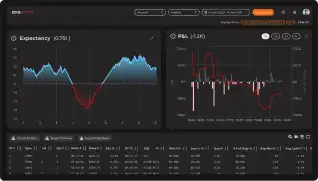
July 09,2024 @08:01 AM
Developing strong discipline as a trader is similar to the strategic approach utilized by baseball players when they step up to the plate. Accomplished hitters enter the batter’s box ready with a gameplan, identifying which pitches to attack or lay off of. They have a keen understanding of a pitcher’s tendencies through analyzing past at-bats, helping them to anticipate a pitch when they step into the box. These disciplines help these players to refine their game with an adaptable yet decisive mindset when approaching the plate. Similarly, traders who analyze the markets and hold themselves to a rigorous trade discipline strategy position themselves for consistency and resilience overtime.
Why Do You Need Trade Discipline?
Trade discipline within the futures market is marked by a trader’s ability to adhere to trading structure while also maintaining composure with their emotions and actions when planning and executing trades. Every trader will have a bad day, but by carefully following predefined trading plans and strategies, they can better manage the components of a trade that are in their control. By having predetermined personal rules, a trader can avoid impulsive decisions and lead their trades with a rational mindset. Traders should be constantly striving to not only be disciplined within their trades, but to continue to have their goals and plan evolve alongside their trading journey and the markets.
Creating Trade Discipline
Every trader’s approach to trade discipline tends to differ to some extent—this is influenced in part by areas such as diverse markets, account sizes, trading styles, and more. Although there are some similarities that exist between commodities within a given market, they will often have distinct differences as well. Factors such as liquidity, volatility, and market sentiment can have a large influence over how traders curate their strategies and uphold and adjust their discipline. There are various methodologies that traders can implement to maintain a disciplined approach when trading.
1. Do Your Homework
Understanding the markets tendencies and doing your homework is key when setting yourself up for a trading day. Traders should equip themselves with as much knowledge, statistics, and research when navigating the markets as they can. Below are some ways that a trader can keep a pulse on the markets:
- Find out how the market has been performing recently.
- Use statistics to create situational scenarios.
- E.g. Statistically, when the market does this, it can do this X% of the time.
- See if certain events throughout the day will alter the market’s behavior.
- Reflect if there are any events in your life that will alter your behavior.
- Create 3 different scenarios on how the market will react for the day
- E.g. If this happens, then this may occur.
2. Daily Loss
Determining the amount of risk capital allocated for trading is vital for establishing the threshold for losses on any given day. While every trader would like to aim for daily profits, encountering daily losses are almost inevitable. Therefore, setting a daily loss limit can be a safeguard against volatile markets.
For instance, consider a trader that funds their account with $10,000 of risk capital and sets a 1% loss limit of $100. By utilizing this strategy, the trader can experience 100 consecutive days of $100 losses while maintaining financial stability. Note that stop losses/loss limits effectiveness can vary based on market conditions along with the speed of price movements. Therefore, there is always a possibility that a loss limit may not be triggered.
3. Daily Profit
One may wonder, “Why would I set a limit on the amount I can profit in a day?” Given the unpredictable nature of markets, it is important to navigate the ups and downs to your advantage. Depending on the side of a trade that a trader is on, they have the ability to profit off of market volatility. While they can make profits from volatility, it is crucial to note that potential future swings throughout the day can turn those same profits into losses.
4. Review and Adaptation
Consistently review your trading performance by analyzing both successful strategies and areas that need improvement, then refine and adjust your plan accordingly. Adaptability and structure are key for traders looking to improve their trade discipline. Keeping a comprehensive trading journal in which you document every trade with entry and exit points, rationale behind your trade decisions, emotions encountered during the trade, and post-trade reflections can all help with improvement.
Regularly reviewing your journal allows you to identify patterns, recognize strengths, and pinpoint areas that could use improvement within your trading process.
Emotional Discipline
Emotions can become heightened within the trading world—with high volatility, pressure to make split-second decisions, uncertainty, and a handful of other factors. For a trader to experience long-term success, it is important to sustain emotional discipline when executing trades. Below are three key areas to consider reflecting upon if you’re looking to improve your emotional discipline.
Limiting Fear and Greed
I believe that having a hold on both your fear and greed is crucial for futures trading. Fear holds many traders back due to the fear of losses. This can lead them to exit a trade prematurely and lose an opportunity for a profitable position. It can also make traders overthink a calculated risk that may result in a profitable trade. One way to limit fear within trading is through setting a daily loss limit, which is mentioned above. Although greed may hold a different weight, it manifests through the same desire to be profitable.
Many traders become desperate to make ‘quick gains’ which can lead to a trader making choices that involve a high amount of risk. This could be done through overleveraging positions, or holding onto a losing trade with the hopes that it will turn profitable. You can manage greed through setting realistic profit goals and going through every stage of a trade with your trading plan.
Managing Impulsive Thoughts
Almost everyone is guilty of giving into their impulses and ditching their plan when they’re in the heat of the moment. I am not going to say that there is some magical switch that you can flip to turn off your impulsive-side or that you will never have urges as you continue to trade more. We are imperfect beings, therefore even the most well-thought-out mental strategy will come with flaws. When you deviate from your trading strategy and are led by your impulses, it’s like you are betting on a horse you know nothing about, which could lead to substantial losses.
You can manage your impulses by creating a pre-trade routine that you hold yourself to every trading day. Look at this routine as a ritual that you must perform before you even think about any moves that you plan to make for the day. Below are some points that could be helpful within your daily pre-trade plan; remember that this is unique to each trader and it should be built it in a structure that brings you value.
1. Set Goals and Targets
Establish your goals and targets for the upcoming trading session. Be sure to make them attainable and clear so that you are able to combat any impulsive thoughts that may occur. If you notice that your current goals are not hitting the mark for the day, take some time to reassess and adjust your plan.
2. Build Discipline Through Small Wins
Breaking down your trading goals and aspirations into achievable small wins is a key way to remain disciplined in your trades, while also building up confidence. They didn’t build Rome in a day, so why should you push unrealistic results prematurely? By focusing on these small wins, you are not only sustaining your trading, but also taking incremental steps towards achieving consistent profitability. Every small victory reinforces your commitment to your trading plan and increases your psychological resilience to maneuver the futures space.
3. Do Mental Checks
Breaking down your trading goals and aspirations into achievable small wins is a key way to remain disciplined in your trades, while also building up confidence. They didn’t build Rome in a day, so why should you push unrealistic results prematurely? By focusing on these small wins, you are not only sustaining your trading, but also taking incremental steps towards achieving consistent profitability. Every small victory reinforces your commitment to your trading plan and increases your psychological resilience to maneuver the futures space.
4. Review Past Trades and Your Trading Plan
Take time to reflect on your recent trades and see if you can identify any patterns, recurring errors, or areas that have room for improvement. Revisiting past mistakes will require a candid assessment of the strategies you used, what market conditions were like, and any significant news that may have had an impact on the markets.
5. Seek Out Market News
It’s important to stay informed and remain vigilant of any news events that could have an impact on the futures markets. This could include news areas such as geopolitical interactions, economic indicators, natural disasters, and more. Be sure to seek out bipartisan news or cross-examine news from sources with varying perspectives to gain a stronger understanding of the overall sentiments of the news.
In Conclusion
Gaining trade discipline isn’t a one-and-done endeavor—it is like sculpting a muscle through well-planned training, adapting to injury or stagnant progress, and persevering through obstacles. Connect your trade discipline journey to the baseball hitter analogy. You can memorize every opposing team’s pitcher’s previous plays and most-used pitches and it will serve as a strong piece of information when up-to-bat. However, there is always a chance that an unknown variable could impact you when you’re at the plate. This could be facing a new pitcher, poor weather conditions such as wind or rain, or you could simply be having an off day. When it comes to trading, having every controlled variable down to a science is crucial. There are a plethora of outside factors that can impact your trades, from market conditions, current events, and your mental state. With consistent discipline, training and adaptability, traders and
hitters alike can fine-tune their craft. As you prepare to face the markets, remember that unexpected changes may arise—be ready to put your trade discipline into practice towards your pursuit of long-term success.
~Niko Pozzi, Broker

